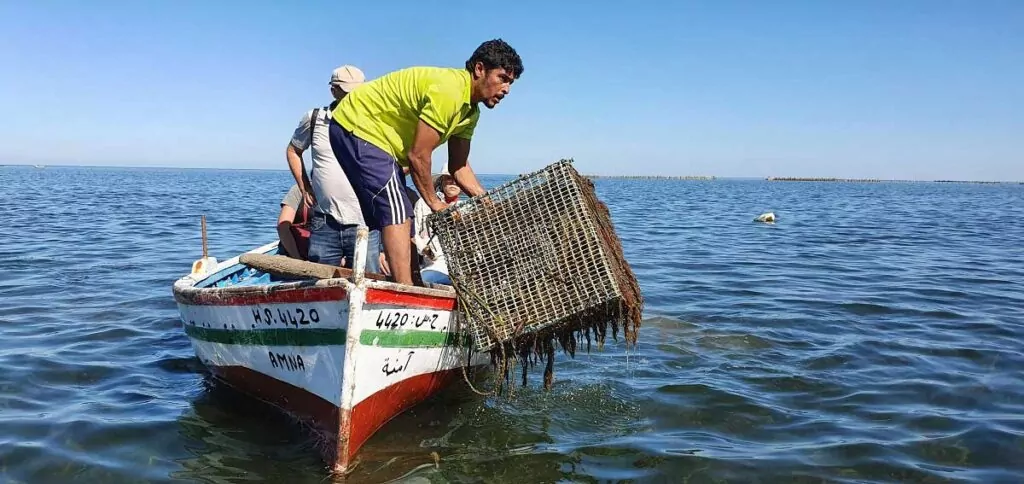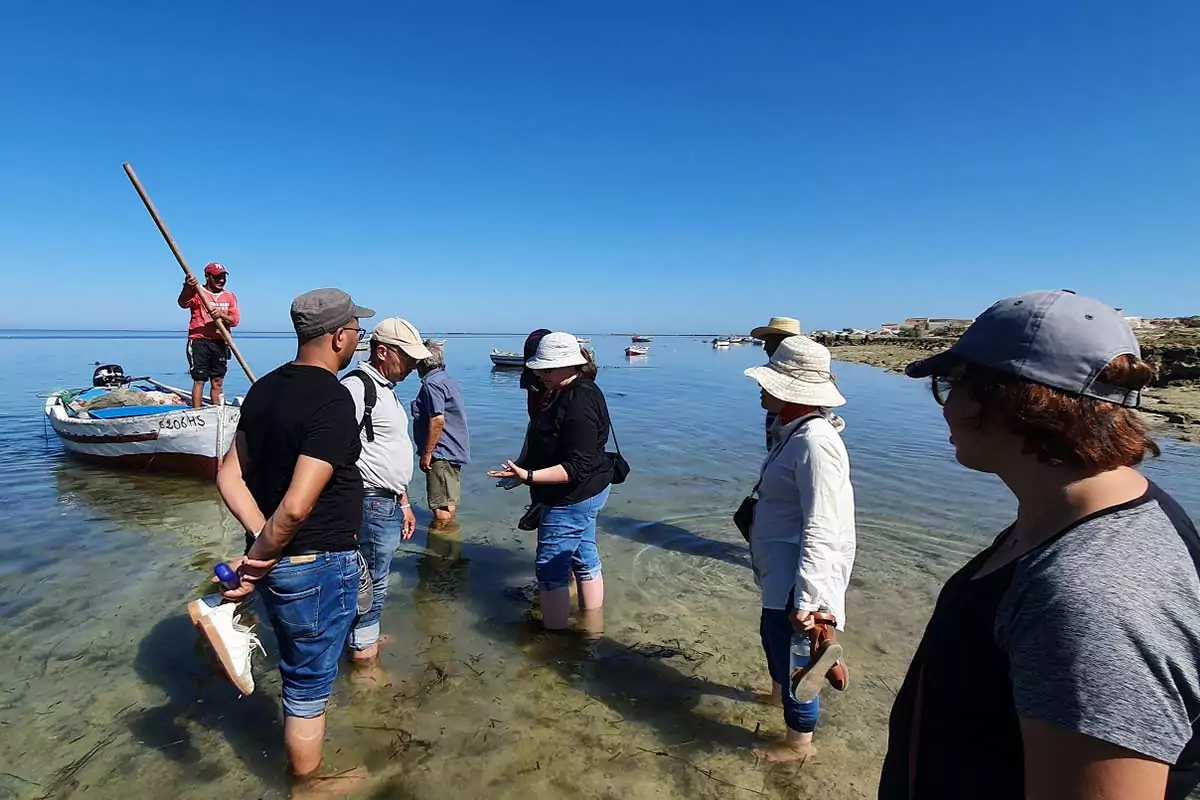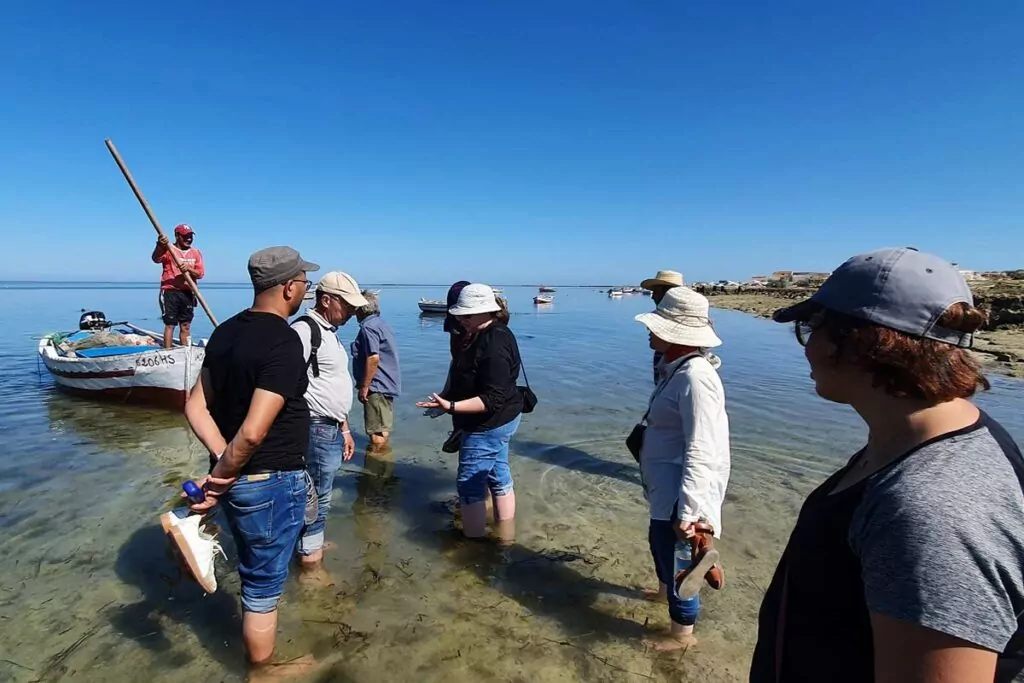Changes in coastlines are natural processes but the gradual disappearance of beaches has accelerated and increased dramatically in the last decades. Tunisia is receding the fastest at the Mediterranean basin with an average of 64 cm per year with annual losses estimated at 3% of GDP in Tunisia. Djerba Island, located in the southern part of Tunisia is a highly touristic island and classified as a hotspot example that is subject to severe erosion, which may impair tourism, implying huge potential revenue losses. The beaches of the north-eastern and south-eastern coasts are undergoing an alarming level of erosion reaching up to 4.12 m/year. Very visible is this on hotel sites close to the beach.
The MeerWissen project “Oceanographic and Ecological Data for Nature-based coastal protection” (ORIENTATE) addresses these challenges by providing sustainable, cost-effective data and developing a living lab of nature-based mitigation using seagrass transplantation to mitigate erosion at the coasts of Djerba. The Tunisian and German researchers from University of Sfax and the Alfred Wegener Institute use seagrass, which was prominent on these spots before to safeguard the coasts on a long-term scale. Using the concept of living lab, ORIENTATE combines two approaches at the same time. On the one hand, a living laboratory of co-creation bringing together all the stakeholders involved with their different specialties and experiences to reflect together on ways to ensure the success and sustainability of the activities of the project and its results. On the other hand, the setting up of a pilot site in the marine environment where researchers will carry out seagrass transplantation trials. The project aims for bringing together a wide range of stakeholders including the Coastal Protection and Development Agency, Ministry of Environment, Ministry of Equipment, Dejrba Municipalities, Fishery and Aquaculture Division of the Ministry of agriculture (national and regional), scientists, local tourist managers and hotel managers, the fishing communities and fishing cooperation, as well as youth organisations, non-profit ecological clubs, and local NGOs on Djerba.
Co-designing partnerships for sustainable development
To ensure acceptability of the project, its success and sustainability, Tunisian and German researchers have started to build good relationships with different stakeholders based on the exchange of knowledge and trust. Subsequent on bringing together the above-mentioned stakeholders, marine researchers of the University of Sfax held door-to-door meetings with these stakeholders, each separately or in small groups with those who already knew each other. The purpose of these meetings is to contact groups of stakeholders, build a trustful relationship, by getting an idea of their opinions about the project, their expectations, and their motivation. Tunisian and German researchers developed a list of potential pilot sites for the project. These pilot sites address needs which were named by the different stakeholders. An important aspect is the accessibility of the pilot side to facilitate monitoring and control. Another criterion for the pilot side is the protection of transplanted seagrass from fishing activities. The stakeholders proposed several pilot sites. The three most frequently mentioned locations are: (1) in front of damaged hotels like Dar Djerba, Ulysse and Radisson, (2) near Zraieb and (3) near an artificial reef.
“These door-to-door meetings enabled us to establish a good reputation and understanding with them, mainly because these meetings made them feel part of the project because it is the first time that a project team contacts them to get their opinions on the different components of the project. The success of these meetings was reflected in the important and active participation of stakeholders during the first stakeholders’ workshop”
Lobna Boudaya from the University of Sfax in Tunisia
During these meetings and the workshop and through consultation with various participants, researchers were able to identify sensors to measure, among other things, currents, waves, and nutrients. They also identified possible pilot sites and possible risks for seagrass restoration, such as shallow bottom trawling, pollution, possible conflicts between stakeholders, bureaucracy, invasive species, turbidity, current, site selection and urbanization. Finally they identified how to ensure the sustainability of the project, for example through partnerships with national authorities and local organisations, an adaptative and flexible communication strategy, ambassadors from local population and the involvement of fishermen.
After these first two contacts, also other stakeholders, such as Tipaza diving centre and the association of Tipaza Djerba diving club, showed interest in joining the project to restore seagrass and conserve the biodiversity at the coasts of the island of Djerba. The topic of the project coincides well with their main areas of activity. Moreover, they have demonstrated that they have personnel and equipment to perform planning-intensive activities, such as sampling or transplantation. In return, they are interested in participating in certain training courses that will be held as part of the project.

Simple language is key to successful partnerships
At the beginning, the local communities, affected residents and fishermen were reluctant because they had the idea that the scientists were using scientific terms they were not familiar with. “To solve this problem and encourage them to cooperate and trust us more, we decided to use simple and local language so that all participants with their different educational backgrounds could easily understand us and access the information”, emphasised Lobna Boudaya. Some stakeholders work on the same issues, for example fishing, tourism, beach cleaning in terms of removing seagrass leaves for tourists versus nature and coastal conservation, which could lead to conflicts between them. To avoid conflicts, the door-to-door meeting approach was very effective to gain stakeholders trust, motivation, and interest in the topic of the project.
After the first meeting and workshop with a family atmosphere where everyone could speak their mind, a clear change became apparent. Some of them, such as the Promotion of Agricultural Development Groups (GDA), Zraieb Djerba and GDA Sedwickech, supported the researchers to visit some possible pilot sites.
From co-design to implementation
Based on the activities in the co-design phase the main stakeholders have been identified such as the Coastal Protection and Development Agency (APAL), a Tunisian non-administrative public institution under the Ministry of Environment, which is responsible for managing the coast, monitoring its development, and regulating existing conditions that are contrary to the laws and regulations governing the public marine domain. It also conducts specialized studies and research on coastal protection. It establishes coastal ecosystem observatories, rehabilitates, and manages natural coastal areas, such as wetlands, coastal forests, islands. APAL, diverse municipalities, Djerba management organisation and the hotel and tourist managers will be highly involved in the activities of the implementation phase.
At the beginning of the implementation phase, a second workshop will be organised to share the results of the co-design phase, such as the most cited pilot sites and the means to ensure the sustainability of the project with all stakeholders, and to present the activities planned under this new phase. All participating stakeholders will identify the pilot side that will be considered for further investigation. Furthermore, a video will be published about the co-design approach of the project including the statements of some of the participants of the first workshop. In addition, it is planned to create three more videos which will focus on the state of coastal erosion in Djerba, Nature-based Solutions and co-designing a research project.


